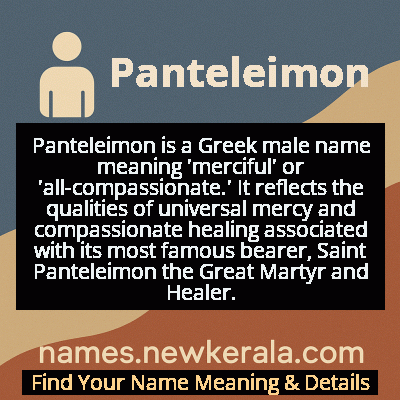Panteleimon Name Meaning & Details
Origin, Popularity, Numerology Analysis & Name Meaning of Panteleimon
Discover the origin, meaning, and cultural significance of the name PANTELEIMON. Delve into its historical roots and explore the lasting impact it has had on communities and traditions.
Name
Panteleimon
Gender
Male
Origin
Greek
Lucky Number
7
Meaning of the Name - Panteleimon
Panteleimon is a Greek male name meaning 'merciful' or 'all-compassionate.' It reflects the qualities of universal mercy and compassionate healing associated with its most famous bearer, Saint Panteleimon the Great Martyr and Healer.
Panteleimon - Complete Numerology Analysis
Your Numerology Number
Based on Pythagorean Numerology System
Ruling Planet
Neptune (Ketu)
Positive Nature
Intuitive, analytical, spiritual, and inquisitive.
Negative Traits
Secretive, reserved, aloof, and can be overly critical.
Lucky Colours
Green, yellow.
Lucky Days
Monday.
Lucky Stones
Cat’s eye, moonstone.
Harmony Numbers
1, 5, 6.
Best Suited Professions
Scientists, researchers, spiritual leaders, detectives.
What People Like About You
Depth of knowledge, analytical skills, spirituality.
Famous People Named Panteleimon
Saint Panteleimon
Christian Saint and Physician
Venerated as the Great Martyr and Healer in Eastern Orthodoxy
Panteleimon Ponomarenko
Soviet Politician
First Secretary of the Communist Party of Belarus and Soviet ambassador
Panteleimon Kulish
Ukrainian Writer
Influential figure in Ukrainian literary and cultural revival
Panteleimon of Alexandria
Orthodox Patriarch
Greek Orthodox Patriarch of Alexandria for 17 years
Name Variations & International Equivalents
Click on blue names to explore their detailed meanings. Gray names with will be available soon.
Cultural & Historical Significance
Extended Personality Analysis
Individuals bearing the name Panteleimon are typically characterized by exceptional compassion and a natural inclination toward healing and service. The name's meaning of 'all-merciful' often manifests in personalities that are deeply empathetic, patient, and nurturing, with a strong desire to alleviate suffering in others. They tend to possess remarkable emotional intelligence and intuitive understanding of human needs, making them excellent caregivers, counselors, and mediators. These individuals often demonstrate a unique blend of practical problem-solving skills and spiritual depth, reflecting the historical Saint Panteleimon's dual role as physician and martyr. Their mercy is not passive but active - they show great determination in helping others and maintaining their principles even under pressure. The name also suggests a person of strong moral character who balances idealism with practical wisdom, capable of making difficult decisions while maintaining their fundamental compassion and respect for human dignity.
Modern Usage & Popularity
In contemporary usage, Panteleimon remains primarily confined to Orthodox Christian communities, particularly in Greece, Russia, Ukraine, and other traditionally Orthodox countries. While not ranking among the most popular names, it maintains consistent usage among families with strong religious traditions or medical backgrounds. The name has experienced a modest revival in recent decades as part of the broader trend toward traditional and meaningful names with historical significance. In Greece, the diminutive form 'Pandelis' is more commonly used in daily life, while the full 'Panteleimon' is typically reserved for formal and religious contexts. The name's association with healing and compassion continues to make it appealing, particularly among healthcare professionals and those valuing these virtues. Its usage outside Orthodox communities remains rare, though it occasionally appears among families with Greek or Russian heritage seeking to honor their cultural roots.
Symbolic & Spiritual Meanings
Symbolically, Panteleimon represents the highest ideals of mercy, healing, and unconditional compassion. The name embodies the concept of all-encompassing mercy that extends to every human being without exception, reflecting its Greek etymology meaning 'all-merciful.' It symbolizes the harmonious integration of scientific knowledge and spiritual wisdom, as exemplified by Saint Panteleimon's dual identity as skilled physician and devout Christian martyr. The name carries powerful connotations of protection against suffering and illness, serving as a symbolic shield in many cultural and religious traditions. Metaphorically, Panteleimon represents the transformative potential of compassion - the ability to heal not only physical ailments but also emotional, psychological, and spiritual wounds. It signifies the human capacity for profound empathy and the moral imperative to actively work toward alleviating suffering in all its manifestations throughout society.

